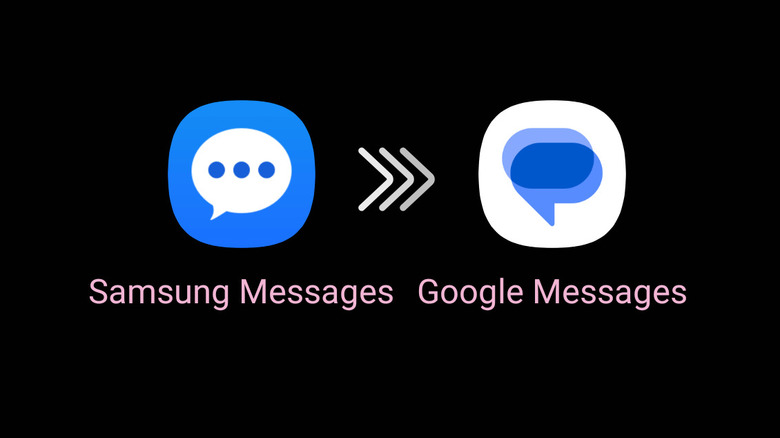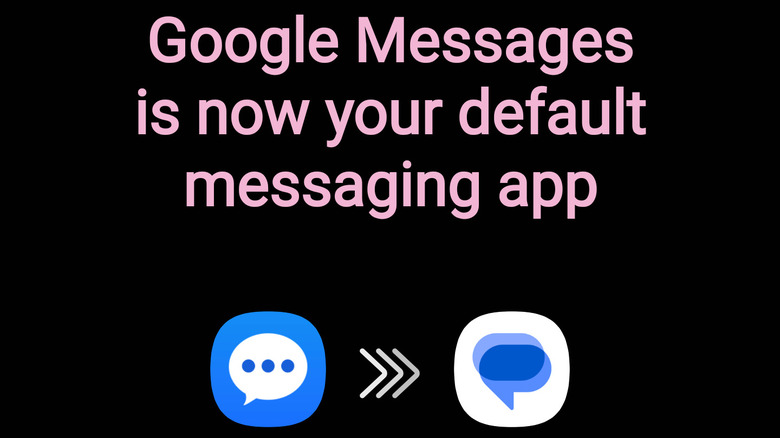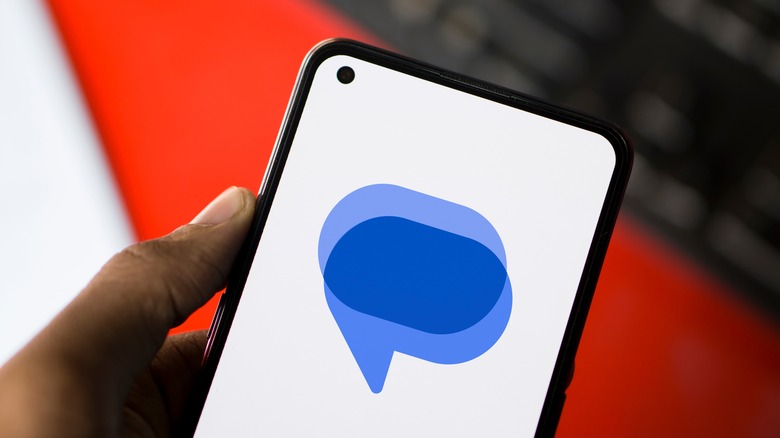Samsung Messages Vs. Google Messages: Why Switching Makes Sense
Buying a Samsung Galaxy phone can be a confusing experience thanks to the Korean tech giant's annoying inclusion of what appear to be duplicate apps. After unboxing your shiny, new Galaxy phone and booting it up, you're confronted with multiple calendar, clock, browser, and messaging apps, to name just a few. For users unfamiliar with Samsung's approach to Android, it's baffling to sort through them. While Google's apps are familiar to more users, Samsung's clones offer better integration with the company's hardware ecosystem and often offer some truly useful features. Even as someone who has regularly used Samsung phones since the Galaxy S III was all the rage, I still frequently swap between apps from both companies.
The choice between Samsung Messages and Google Messages can be especially confounding. Most users are likely to use whichever apps their phone comes with by default, according to a 2020 study from Meta. But when two preinstalled apps jockey for a user's attention, it's tempting to pick one at random. When it comes to your messaging app, that choice can have ripple effects, as you might miss out on useful communication features.
However, in the case of Samsung Messages vs. Google Messages, there's one clear choice. Google Messages is here to stay, and Samsung Messages has accepted defeat. Having developed a closer relationship with Google in recent years, Samsung has somewhat relegated its own messaging app to the background, and even offered a bespoke version of Google Messages that conformed to its One UI design philosophy. But more recently, Samsung made an announcement about the future of its texting app, holding up a white flag to Google.
Even Samsung wants you to use Google Messages
The bottom line is that Google Messages will be the best choice for most people, not Samsung Messages. Not only has Google done a lot of work to make its messaging app the Android equivalent of iMessage, but even Samsung would prefer you use it at this point. When I attempted to switch back to Samsung Messages while writing this article, I was greeted with the screen you see in the above image directing me back to Google Messages.
In fact, Samsung Messages will no longer come installed on any of its devices, leaving Google Messages as the clear — and only — choice between the two. The move was announced in July 2024, presumably as a part of Google's broader push to make its implementation of RCS chats the default on Android. That means it's the end of the road for the remaining, faithful users of Samsung Messages. It's unclear whether Samsung plans to deprecate the app entirely, perhaps forcing users over to Google Messages. However, even if it remains available, it will likely be fossilized in its current form without any meaningful updates.
We've seen this story play out before. Samsung has long been wary of its reliance on Google's software, and shipped Galaxy Watches running its own Tizen OS for many years. It seemed to be a way for Samsung to indicate that its hardware wasn't a mere delivery mechanism for Mountain View software. Eventually, though, the chaebol fell in line, adopting Google's WearOS with the Galaxy Watch 4. Since then, we've seen Samsung embrace its symbiotic relationship with the search giant even more, such as when it merged its Quick Share feature with Google's Nearby Share. The abandonment of Samsung Messages is yet another clear sign of that deepening bond.
It's not all bad news for the Samsung faithful
The main reason to choose Samsung Messages was always its integration with other Samsung products like a Galaxy Tab tablet or Galaxy Book laptop. Using the "Call and text on other devices" feature in One UI, users are currently able to use the Samsung Messages app on any device to continue text conversations from their phone. It's one of many productivity tricks on Galaxy devices. However, this feature is a bit redundant since Google Messages is also multi-platform, with a tablet app and desktop web app to extend its functionality. Full fat apps like Samsung offers for the tablet version of Samsung Messages would be nice, but given Google's vested interest in web apps thanks to its Chrome platform, that's unlikely to happen anytime soon.
What you do get from Google Messages is a singular vision for RCS on Android. RCS, or Rich Communication Services, is the instant messaging protocol that Google has helped push to widespread adoption on both Android and iOS. Now that Samsung has joined forces with Google, it's clear that Google Messages is the app both companies see as the future. It's where you're most likely to get the best RCS experience, especially when chatting with other Android users.
Not to mention, since the vast majority of Android users will now be using Google Messages, bespoke features Google builds into it will work more seamlessly. For instance, you can easily schedule texts on Android, send animated, custom emoji reactions, and more. Google has a history of horrendously mismanaging its messaging strategy, but with Google Messages, the company appears to have developed a refreshing clarity of vision.


